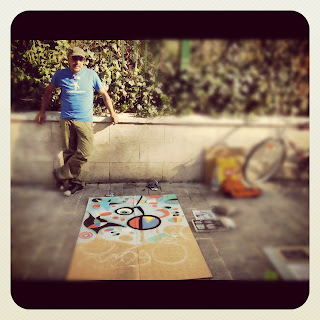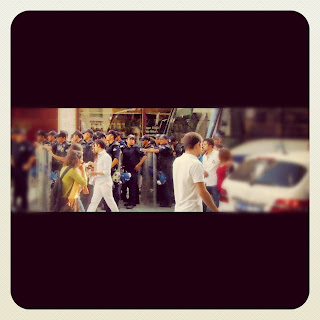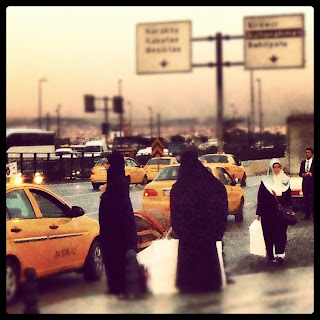Turkish Police and Culture
Apologies for backtracking a wee bit, but I want to get back to some first impressions and Armando’s expected run-in with the Turkish police. Our first week we came to the conclusion that 50% of Istanbul’s population were employed in careers* starting with the letter ‘P.’ Parking attendants and police.
You can’t walk five yards without bumping into one or the other, or in a ‘P’ zen moment, both. We were warned by friends from Bulgaria (Galia and Veronika) that Armando and his street art might have a few problems with the police here. And we’ve all heard those darkly disturbing tales about Turkish prisons…
Nonetheless, he found his spot he wanted to chalk. It was in front of the Mosque next to the Spice Market. He was stopped, by the police, before he’d even finished the grid.
Preface to what I’m going to say next: yes, I do understand I’m in a foreign country. Yes, I do think it’s wrong to expect people to a-speaka-my-language when I’m visiting their home turf.
But. International cities usually have English as the lingua franca, lucky for us.

Not so Istanbul. We’ve got every variation, usually ‘English! Yes! Michael Jackson! Bslkdfjadlskfja;lsdfjasdlkf! (something in Turkish, loud and slow, with a lot of aggressive hand gestures that speak tomes of volumes on their own).
Armando’s first intro to the Turkish police involved a crowd of 50 observers gathered, some sort of a translation, and he had to pack up. It’s against Turkish law to ‘draw on Turkish soil.’ No joke. The plus side was that one of the onlookers, a young woman, gave Armando 30 Lira in support of his art.
He was fuming, and then came up with a solution: to buy some woodenish squares that he could lay out, and then draw on them. Thus avoiding the whole dirtying of Turkish ground dilemma.
This was the same day that the film crew had moved us across the park, to where the police have their coffee in our neighborhood. We asked them about the legality of using the boards, they said ok. I left Armando and the police bonding, one of the policemen was a painter. They also bought him a huge bottle of Cola- a sign of solidarity- and gave him a contact in case he had any further police problems.

Boards bought and tested, back he went. As luck would have it, the same cops were on the same beat: problem! This time, according to another broken translation, the boards were now an ‘issue of public safety.’ The policeman then goes on to tell him that he won’t have a problem across the bridge, and if any police do harass him to ‘just describe me, they know me.’
Riiight. ‘Oh, sorry officer. The policeman across the bridge- of average Turkish height, build, coloring that speaks only Turkish? Yeah, well he told me to come here. You know, the one wearing a uniform.’
He decides to change locations, to the main tourist street- Istiklal- and finally finds a little corner for his world among the musicians. It’s just not the same, though- the point of doing his art in chalk is using the street. There might be another possibility, through SALT. They’ve offered their courtyard and support. We shall see.
 A few other points, the funny oddities here. Next to the hostel is Trannie central (just saw a fine looking lady saying her goodbyes to her fella as I was drinking coffee), along with the aptly named ‘Cheeky Club’ they frequent. It’s emblazoned in flamingo pink, just to the left of the hostel balcony.
A few other points, the funny oddities here. Next to the hostel is Trannie central (just saw a fine looking lady saying her goodbyes to her fella as I was drinking coffee), along with the aptly named ‘Cheeky Club’ they frequent. It’s emblazoned in flamingo pink, just to the left of the hostel balcony.
Turkish numbers crack me up: one= beer, two= icky, 3= ouch 4= dirt. At least in our mangled tongue.

Ramadan began yesterday, and it’s a religious sacrificial/family celebration. Perhaps something like Thanksgiving for Americans. In the evening, the women are hidden and the men were carousing until dawn. Some still are.
The funny thing about Turkish men: they are ever so comfortable* with their sexuality. I mean, my first day here I saw a half-naked man inspecting his goods in the middle of a restaurant. Nobody batted an eye or a lash. Men walk hand in hand, arm in arm down the street- literal male bonding. Though a brief visitor might think the Turks superbly open towards gay men.
I don’t like the subservience of women, especially the women in their black head-to-toe niqaabs/niqabs that are always scurrying behind a Very Important Man. A man who never looks back to see if she’s keeping up. It’s something I don’t understand, but it’s also something I have to respect. I chose to come here. I’d be lying if I said it didn’t bother me, though.
Not as a Western woman. Just as a woman. -Westfalia Digital Nomads

TAG
A few other points, the funny oddities here. Next to the hostel is Trannie central (just saw a fine looking lady saying her goodbyes to her fella as I was drinking coffee), along with the aptly named ‘Cheeky Club’ they frequent. It’s emblazoned in flamingo pink, just to the left of the hostel balcony.






